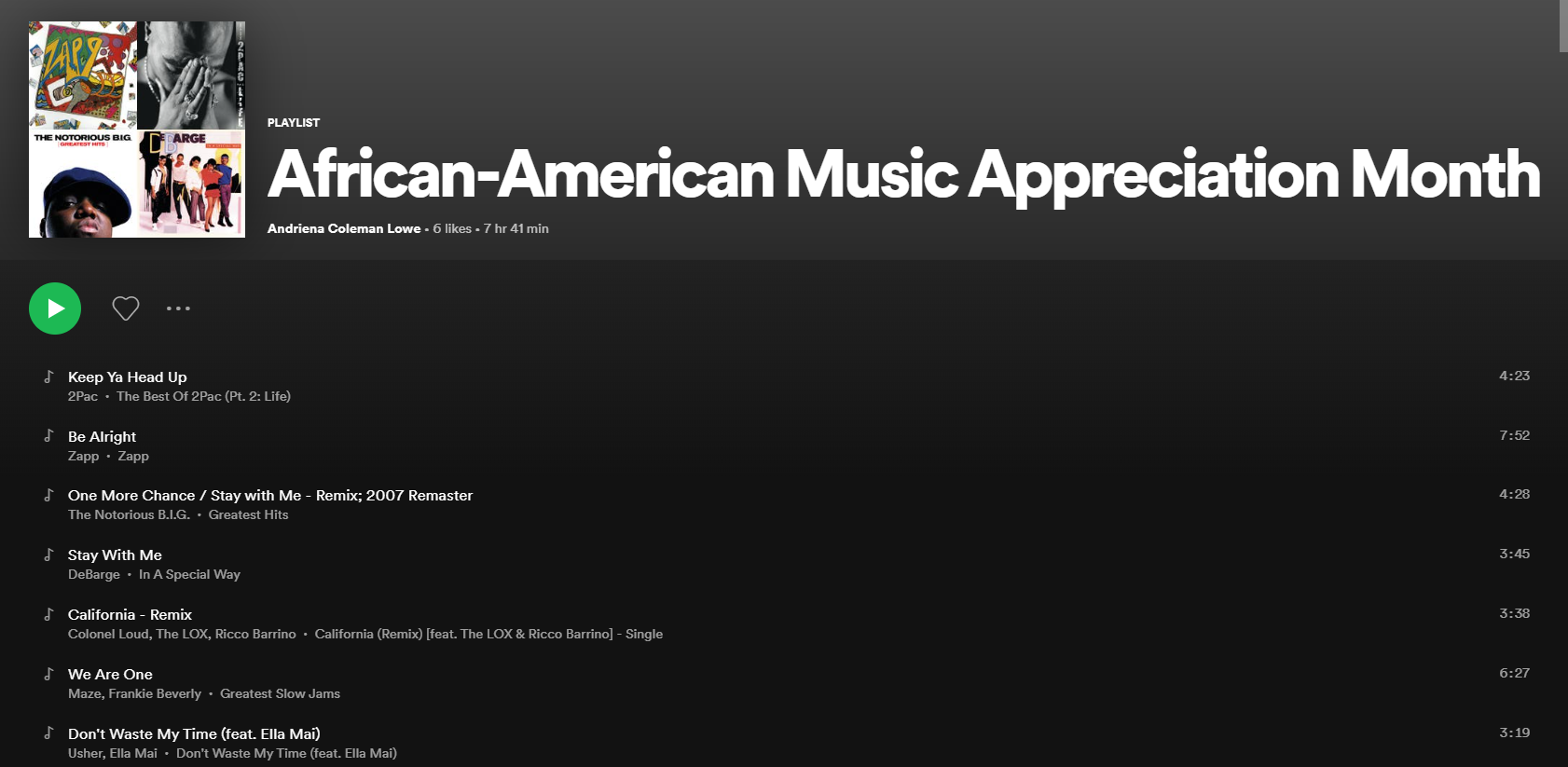Community Spotlight: Black Music Month and Juneteenth
Your stories have power. They bring ideas to life and can shape how others see the world. Here at Hearts, we use stories to build community.
This is the first post in our Community Spotlight Series, where we feature Hearts who identify with a specific culture and have important conversations about how we can support one another.
Throughout the series, we will work closely with these individuals to create an experience where they can share their culture with fellow Hearts. We’ll hear directly from them about their lives, the safe spaces they’ve created to live their truth, and how we can be better allies.
And then we listen.
Because more than ever, stories that celebrate diversity need to be heard.
Celebration in a time of turmoil
The United States is in pain right now. The killing of George Floyd has been a tipping point and catalyst to addressing the systemic issues of racism that affect Black Americans.
Now is a much needed time to come together, celebrate Black culture, hear stories that connect us, and in turn, drive the positive change we believe is needed.
Today is Juneteenth—an American holiday dating back to 1865 that celebrates the Emancipation Proclamation being read to enslaved African Americans in Texas. As the last Confederate state to announce the proclamation nearly two-and-a-half years after the Emancipation Proclamation, it signified freedom for all slaves.
It was a turning point.
Juneteenth is now a holiday or special day of observance in almost every state and is often accompanied by local celebrations commemorating the rich history of Black Americans with traditional songs, poetry readings, rodeos, cookouts, and family reunions.
Giselle Roach, associate director of paid search & social media at Hearts & Science, shares,
“Growing up, we always acknowledged Juneteenth. As a Black American whose parents are from the South, it was important. It signified our freedom.”
Her family usually celebrated with a nice dinner and a glass of wine, but it was common for her to see full-blown celebrations from her neighbors. It was an important part of her upbringing to see people come together and honor the historic day.
Turning up the volume on awareness
It’s also Black Music Month, and Andriena Coleman, supervisor of local TV & radio investment at Hearts & Science, wanted to seize the opportunity to help colleagues experience an important piece of Black culture through her eyes (and ears).
More than that, she wanted people to step outside their comfort zone and try something new.
So with the support of the Hearts & Science Engagement Team, Andriena created a hot Spotify playlist—built with intention for the Hearts team.
 Andriena shares, “Music has a very special place in my heart. It’s been an emotional month and building this playlist has been very therapeutic.” She continues,
Andriena shares, “Music has a very special place in my heart. It’s been an emotional month and building this playlist has been very therapeutic.” She continues,
“It’s so important to foster education—every song in this playlist is intentional. Music has played a pivotal role in providing African Americans with a voice.
Black music has influenced nearly every music genre and should be celebrated as American music history.”
Her hope is that it is the jumping-off point for people to learn more about African American music and culture. Check it out.
Music is one of many elements of Black culture that’s broadly appreciated, but it’s also important to connect these talents back to the individual—to celebrate the Black Americans behind it and hear their stories.
Safe spaces to share
How Andriena built a strong foundation to mentor others
As part of a military family, Andriena grew up in Augusta, Georgia, attending a predominantly white school. As the only African American in early grades, she didn’t have many mentors who she could fully relate to.
Thankfully, that changed after high school when she enrolled in a historically black university, Jackson State University (Jackson, Mississippi), where 85–95% of students and faculty are Black Americans.
This became her safe space.
College is supposed to be a place that prepares you for the world afterward, and JSU did more than that. It helped prepare her professionally and socially in unexpected ways. She shares,
“JSU taught me the power of using a network and the importance of seeking a mentor. We all need someone who sees us.”
And Andriena felt seen at JSU.

Source: Jackson State University Linkedin
She feels a similar safety now, “Hearts is the most genuine agency I’ve worked for. There are spaces where we can collaborate and add input that is actually implemented.”
Andriena’s pro tip: With everything going on in the United States right now, how we protest can look different for everyone. She shares,
“America has been knocked on its heels. All of this comes from pain and anguish. We will come out of this stronger. Hopefully more together and stronger.”
How Giselle learned the importance of being an advocate
Giselle grew up with her sister and parents in New York City in the early 1990s, when the aftermath of the crack epidemic and gentrification left a lot of low-income families struggling.
While Giselle had the privilege of growing up in a middle-class home, her parents taught her from an early age the importance of giving back to her community and supporting others.
Every Sunday, they would head out to New Jersey, pick up perishable foods from BJ’s Wholesale Club, return home, and redistribute it to families in her neighborhood that needed it. And that was just the start.
It was the spark of a love for social nonprofits and activism for Giselle.
And this activism was clearly supported in the example of her parents. They dedicated their lives to advocating for their own future and the future of others. Her father was the first in his family to graduate high school and go to college. Her mother was the first in her circle to reach beyond the established path of becoming a Black American teacher or nurse and start a career in theater before moving into the nonprofit sector.
Today, this relationship has made her parents’ dining room table a safe space. It’s where she knows she can express herself in a way that speaks her truth but is still considerate of other people’s thoughts, their biases, and their reactions.

Giselle’s pro tip: Be an advocate for yourself. She says,
“I find if you’re not willing to advocate for what you believe in or for things that aren’t right, then things don’t change. Your voice makes a difference.”
“It’s not saying you should come in with guns blazing. You need to come in with a reason, say what happened and explain why you don’t like it. If you can offer suggestions for change and ask others what they think, then it opens up an opportunity for open dialogue around difficult topics.”
She hopes, “I want people to feel comfortable having uncomfortable conversations. If we can get people who need those conversations more than others and to get down to the root of the issues, then we can find meaningful solutions together.”
Work should be a safe space too
In the words of Maya Angelou, “Do the best you can until you know better. Then when you know better, do better.”
At Hearts, we’ve come to know better.
By listening to our Hearts, we’ve found ways to support them in meaningful ways. Here are some ideas you can use at your company to show support for the Black community and colleagues too.
- Participate in a network. Hearts & Science invites employees to access the OMG Black Leadership Network and have a voice in how its company supports Black employees and allies. Don’t have one at your company? Contact your human resources department and be the force for change that starts one.
- Attend upcoming company events. Attend every company event that you can. Learn, enjoy, represent your perspective, and share feedback on how your company can create truly inclusive programming. If you don’t have any events, start one.
- Show your support. Our Hearts requested custom Black Lives Matter and Pride email signatures, and many now use them. It’s one small gesture you can make to colleagues and partners to show your support for the Black Lives Matter movement and celebrate solidarity between the LGBTQ+.
Meaningful change can also start with your own biases.
- Open your mind and educate yourself. Giselle suggests, “One of the main reasons we’re still dealing with the situations we’re in today is because people don’t understand their privilege—because they were never challenged to do their homework and see why another group of people feel the way they do.” Some great resources to educate yourself and support Black Lives Matter can be found here.
- Talk about the problems. Andriena suggests, “We need to talk about the problems that people are protesting against so that they feel motivated to act on deliberate changes that influence people of color.” This can start at Hearts & Science!
Christofer Peterson, senior director of talent & engagement shares,
“When our employees talk to their loved ones, I hope they say, ‘The best part of working at Hearts & Science is that I got to be myself. That I’m a proud card-carrying member of this community and I was a pivotal part of celebrating my personal identity here.’”
We’re trying to support our Hearts as best as we can, but it will take our whole community to see change.
Share this with a friend and start an important conversation.
